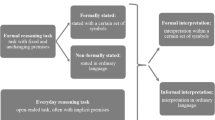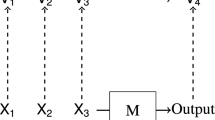Abstract
Martin Davies' criterion for the knowledge of implicit rules, viz. the causal systematicity of cognitive processes, is first exposed. Then the inference from causal systematicity of a process to syntactic properties of the input states is examined. It is argued that Davies' notion of a syntactic property is too weak to bear the conclusion that causal systematicity implies a language of thought as far as the input states are concerned. Next, it is shown that Davies' criterion leads to a counterintuitive consequence: it groups together distributed connectionist systems with look-up tables. To avoid this consequence, a modified construal of causal systematicity is proposed and Davies' argument for the causal systematicity of thought is shown to be question-begging. It is briefly sketched how the modified construal links up with multiple dispositions of the same categorical base. Finally, the question of the causal efficacy of single rules is distinguished from the question of their psychological reality: implicit rules might be psychologically real without being causally efficacious.
Similar content being viewed by others
REFERENCES
Churchland, P. M.: 1981, 'Eliminative Materialism and the Propositional Attitudes', Journal of Philosophy 78, 67-90.
Churchland, P. M.: 1989, A Neurocomputational Perspective, MIT Press, Cambridge, Massachusetts.
Churchland, P. S.: 1980, 'Language, Thought, and Information Processing', Noûs 14, 147-169.
Churchland, P. S.: 1986, Neurophilosophy, MIT Press, Cambridge, Massachusetts.
Davies, M.: 1990, 'Knowledge of Rules in Connectionist Networks', Intellectica 9–10, 81-126.
Davies, M.: 1991, 'Concepts, Connectionism, and the Language of Thought', in W. Ramsey, S. Stich & D. Rumelhart (eds.), Philosophy and Connectionist Theory, Lawrence Erlbaum Associates, Hillsdale, N.J., pp. 229-257.
Davies, M.: 1995, “Two Notions of Implicit Rules”, Philosophical Perspectives 9, 153-183.
Edelman, G.: 1987, Neural Darwinism, Basic Books, New York.
Edelman, G.: 1989, The Remembered Present, Basic Books, New York.
Edelman, G.: 1992, Bright Air, Brilliant Fire, Basic Books, New York.
Fodor, J. A.: 1987, Psychosemantics, MIT Press, Cambridge.
Fodor, J. A., T. Bever, and M. Garrett: 1974, The Psychology of Language, McGraw Hill, New York.
Fodor, J. A. and B. McLaughlin: 1990, 'Connectionism and the Problem of Systematicity: Why Smolensky's Solution Doesn't Work', Cognition 35, 183-204.
Fodor, J. A. and Z. Pylyshyn: 1988, 'Connectionism and Cognitive Architecture: A Critical Analysis', Cognition 28, 3-71.
Jackson, F.: 1996, 'Mental Causation', Mind 105, 377-413.
McLaughlin, B.: 1993, 'Systematicity, Conceptual Truth, and Evolution', in C. Hookway and D. Peterson (eds.), Philosophy and Cognitive Science, Royal Institute of Philosophy, supplement, 34, 217-234.
McLaughlin, B.: 1993b, 'The Connectionism/Classicism Battle to Win Souls', Philosophical Studies 71, 163-190.
Smolensky, P.: 1987, 'The Constituent Structure of Connectionist Mental States: A Reply to Fodor and Pylyshyn', Southern Journal of Philosophy XXVI,Supplement, 137-61.
Smolensky, P.: 1988, 'On the Proper Treatment of Connectionism', Behavioral and Brain Sciences 11, 1-74.
Smolensky, P.: 1991, 'Connectionism, Constituency, and the Language of Thought', in B. Loewer and G. Rey (eds.), Meaning in Mind, Basil Blackwell, Oxford, pp. 201-227.
Smolensky, P.: 1991b, 'Tensor Product Variable Binding and the Representation of Symbolic Structures in Connectionist Systems', in G. Hinton (ed.), Connectionist Symbol Processing, MIT Press, Cambridge, Massachusetts, pp. 159-216.
van Gelder, T.: 1990, 'Compositionality: A Connectionist Variation on a Classical Theme', Cognitive Science 14, 355-84.
van Gelder, T.: 1991, 'Classical Questions, Radical Answers: Connectionism and the Structure of Mental Representations, in T. Horgan and J. Tienson (eds.), Connectionism and the Philosophy of Mind, Kluwer, Dordrecht, pp. 355-381.
Rights and permissions
About this article
Cite this article
Schröder, J. Knowledge of Rules, Causal Systematicity, and the Language of Thought. Synthese 117, 313–330 (1998). https://doi.org/10.1023/A:1005096727650
Issue Date:
DOI: https://doi.org/10.1023/A:1005096727650




